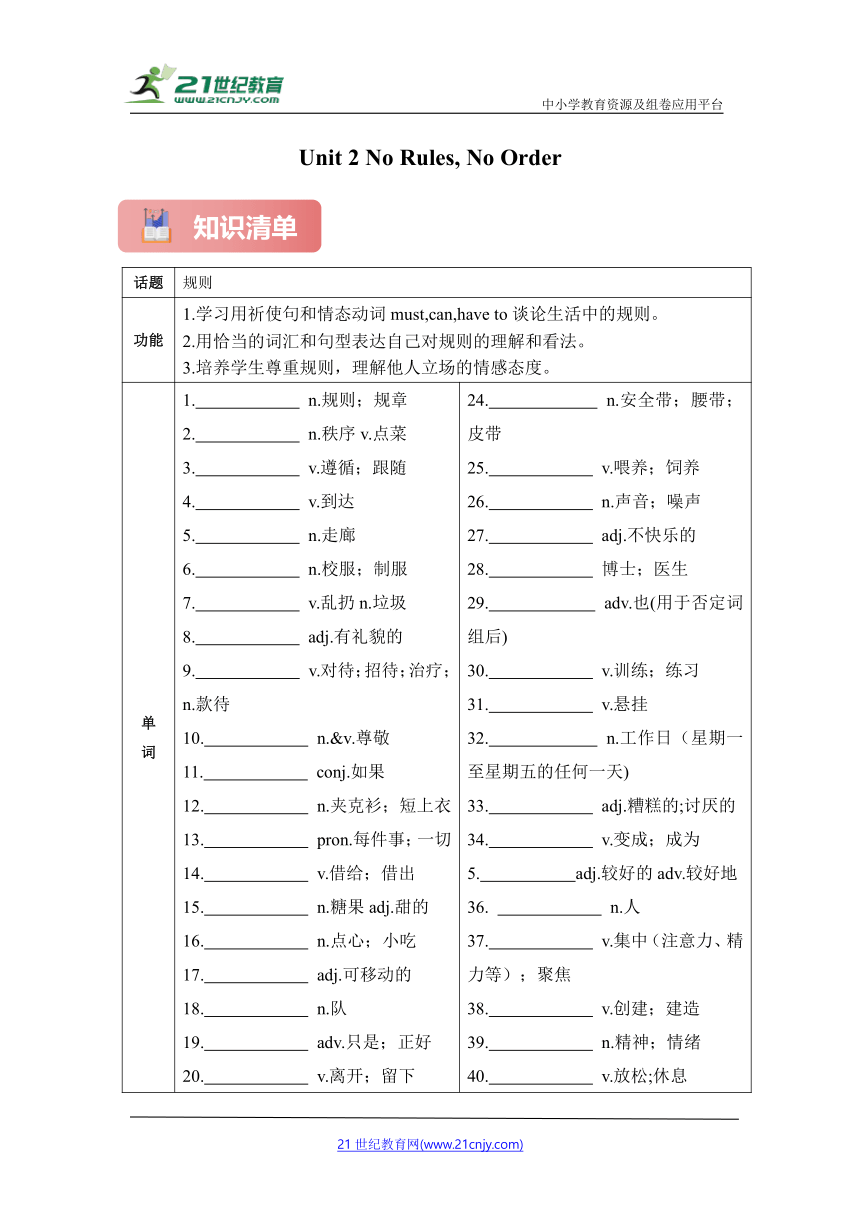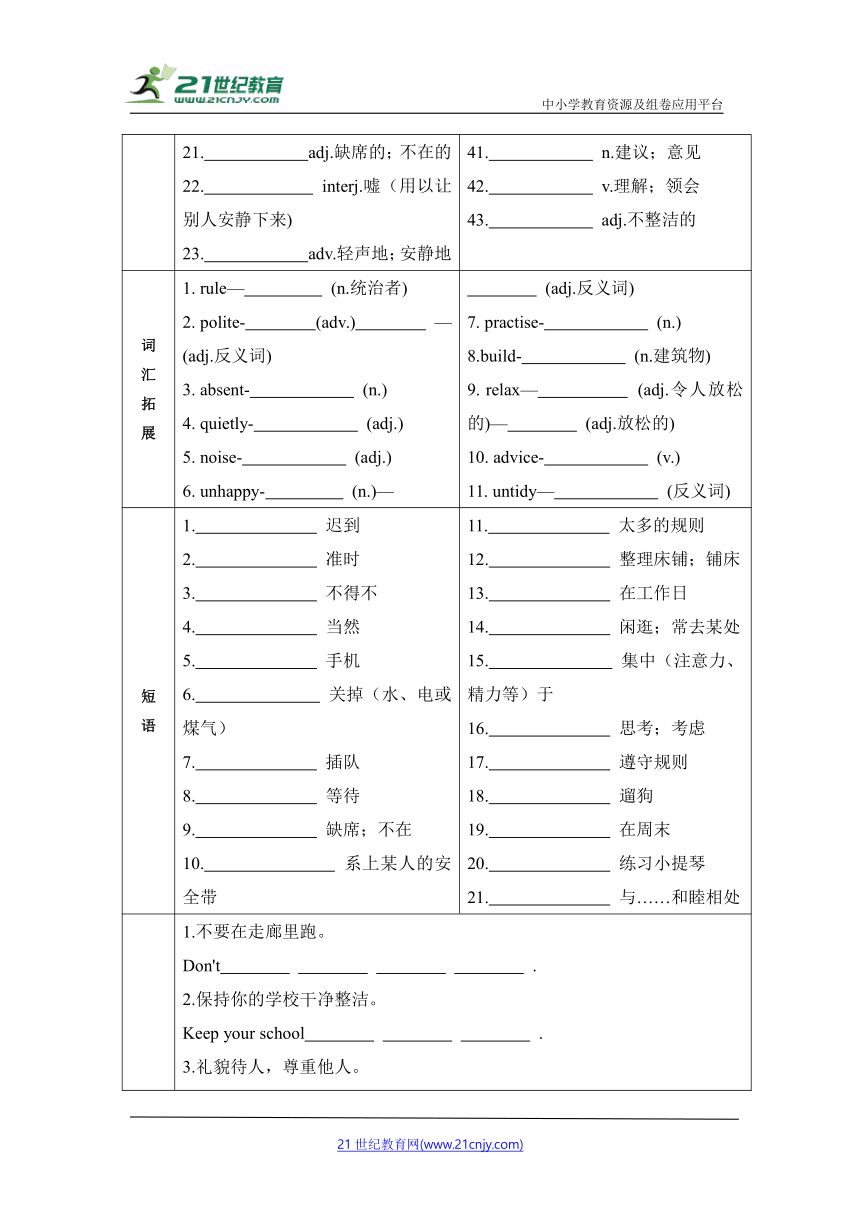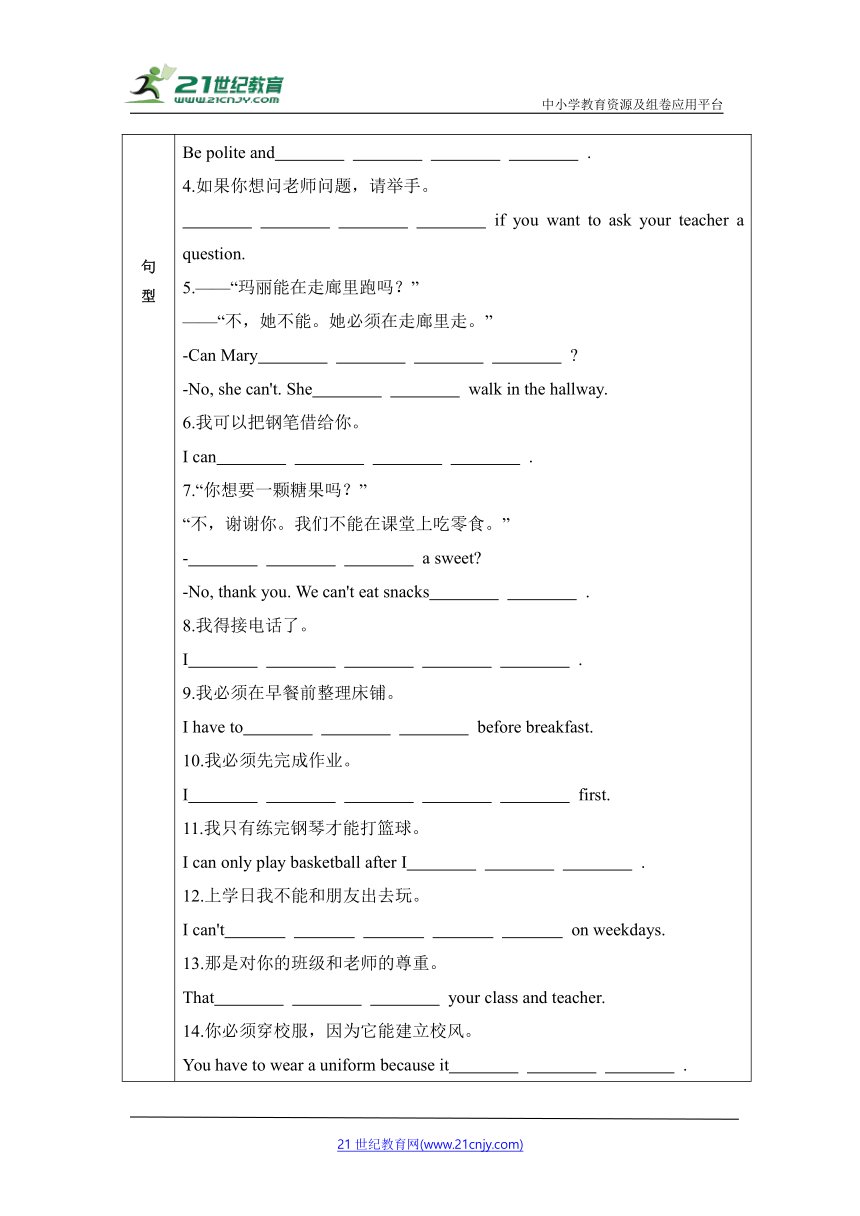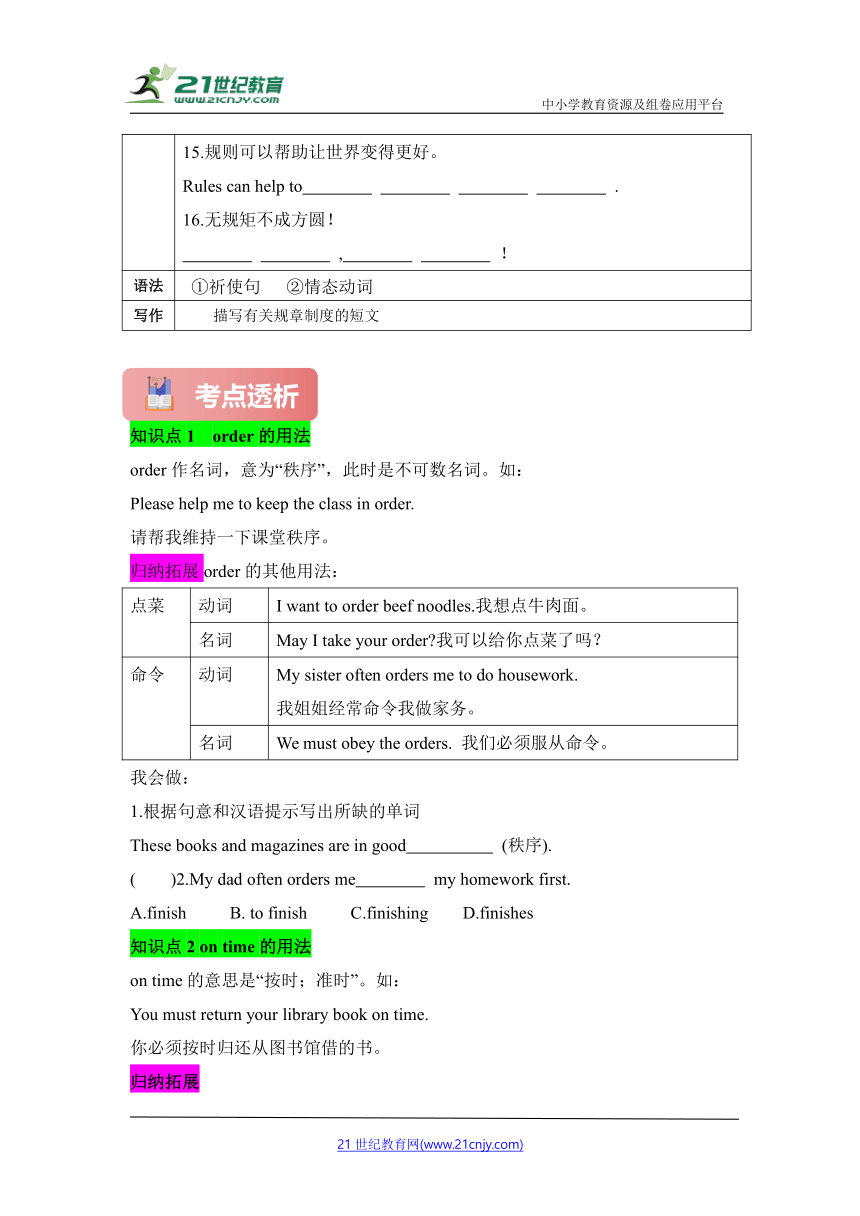Unit 2 No Rules, No Order知识过关表格式清单(含答案) 人教版七年级下册
文档属性
| 名称 | Unit 2 No Rules, No Order知识过关表格式清单(含答案) 人教版七年级下册 |  | |
| 格式 | docx | ||
| 文件大小 | 460.0KB | ||
| 资源类型 | 试卷 | ||
| 版本资源 | 人教版 | ||
| 科目 | 英语 | ||
| 更新时间 | 2025-02-20 19:32:42 | ||
图片预览





文档简介
中小学教育资源及组卷应用平台
Unit 2 No Rules, No Order
话题 规则
功能 1.学习用祈使句和情态动词must,can,have to谈论生活中的规则。 2.用恰当的词汇和句型表达自己对规则的理解和看法。 3.培养学生尊重规则,理解他人立场的情感态度。
单 词 1. n.规则;规章 2. n.秩序v.点菜 3. v.遵循;跟随 4. v.到达 5. n.走廊 6. n.校服;制服 7. v.乱扔n.垃圾 8. adj.有礼貌的 9. v.对待;招待;治疗;n.款待 10. n.&v.尊敬 11. conj.如果 12. n.夹克衫;短上衣 13. pron.每件事;一切 14. v.借给;借出 15. n.糖果adj.甜的 16. n.点心;小吃 17. adj.可移动的 18. n.队 19. adv.只是;正好 20. v.离开;留下 21. adj.缺席的;不在的 22. interj.嘘(用以让别人安静下来) 23. adv.轻声地;安静地 24. n.安全带;腰带;皮带 25. v.喂养;饲养 26. n.声音;噪声 27. adj.不快乐的 28. 博士;医生 29. adv.也(用于否定词组后) 30. v.训练;练习 31. v.悬挂 32. n.工作日(星期一至星期五的任何一天) 33. adj.糟糕的;讨厌的 34. v.变成;成为 5. adj.较好的adv.较好地 36. n.人 37. v.集中(注意力、精力等);聚焦 38. v.创建;建造 39. n.精神;情绪 40. v.放松;休息 41. n.建议;意见 42. v.理解;领会 43. adj.不整洁的
词 汇 拓 展 1. rule— (n.统治者) 2. polite- (adv.) — (adj.反义词) 3. absent- (n.) 4. quietly- (adj.) 5. noise- (adj.) 6. unhappy- (n.)— (adj.反义词) 7. practise- (n.) 8.build- (n.建筑物) 9. relax— (adj.令人放松的)— (adj.放松的) 10. advice- (v.) 11. untidy— (反义词)
短 语 1. 迟到 2. 准时 3. 不得不 4. 当然 5. 手机 6. 关掉(水、电或煤气) 7. 插队 8. 等待 9. 缺席;不在 10. 系上某人的安全带 11. 太多的规则 12. 整理床铺;铺床 13. 在工作日 14. 闲逛;常去某处 15. 集中(注意力、精力等)于 16. 思考;考虑 17. 遵守规则 18. 遛狗 19. 在周末 20. 练习小提琴 21. 与……和睦相处
句 型 1.不要在走廊里跑。 Don't . 2.保持你的学校干净整洁。 Keep your school . 3.礼貌待人,尊重他人。 Be polite and . 4.如果你想问老师问题,请举手。 if you want to ask your teacher a question. 5.——“玛丽能在走廊里跑吗?” ——“不,她不能。她必须在走廊里走。” -Can Mary -No, she can't. She walk in the hallway. 6.我可以把钢笔借给你。 I can . 7.“你想要一颗糖果吗?” “不,谢谢你。我们不能在课堂上吃零食。” - a sweet -No, thank you. We can't eat snacks . 8.我得接电话了。 I . 9.我必须在早餐前整理床铺。 I have to before breakfast. 10.我必须先完成作业。 I first. 11.我只有练完钢琴才能打篮球。 I can only play basketball after I . 12.上学日我不能和朋友出去玩。 I can't on weekdays. 13.那是对你的班级和老师的尊重。 That your class and teacher. 14.你必须穿校服,因为它能建立校风。 You have to wear a uniform because it . 15.规则可以帮助让世界变得更好。 Rules can help to . 16.无规矩不成方圆! , !
语法 ①祈使句 ②情态动词
写作 描写有关规章制度的短文
知识点1 order的用法
order作名词,意为“秩序”,此时是不可数名词。如:
Please help me to keep the class in order.
请帮我维持一下课堂秩序。
归纳拓展order的其他用法:
点菜 动词 I want to order beef noodles.我想点牛肉面。
名词 May I take your order 我可以给你点菜了吗?
命令 动词 My sister often orders me to do housework. 我姐姐经常命令我做家务。
名词 We must obey the orders. 我们必须服从命令。
我会做:
1.根据句意和汉语提示写出所缺的单词
These books and magazines are in good (秩序).
( )2.My dad often orders me my homework first.
A.finish B. to finish C.finishing D.finishes
知识点2 on time的用法
on time的意思是“按时;准时”。如:
You must return your library book on time.
你必须按时归还从图书馆借的书。
归纳拓展
on time 侧重于“按时”“准时”的意思,指按事先规定的时间点做某事,不早也不晚
in time 侧重于“及时”的意思,指赶在恰当的时候做了某事,没有耽误事情
The plane took off on time.飞机准时起飞了。
I was just in time for the bus. 我正好赶上了那辆公共汽车。
我会做:
3.例题根据汉语意思完成句子
(1)我们必须准时到校。
We must get to school .
(2)不可能及时到达那里。
It's impossible to get there .
知识点3 litter的用法
Don't litter.不要乱扔垃圾。
本句中的litter是动词,意为“乱扔”。litter也可作名词,意为“垃圾”。如:
Please don't litter in the classroom.请不要在教室里乱扔垃圾。
The streets are full of litter.街道上到处是垃圾。
我会做:
4.根据音标提示写单词
We are going to collect /'l t (r)/ in the park next weekend.
知识点4 polite的用法
polite是形容词,意思是“有礼貌的”。如:
Most drivers in our city are polite.
在我们城市,大部分驾驶员都很有礼貌。
归纳拓展polite相关词的转化:
我会做:
( )5.Jack is .He always smiles and says hello to others.
A.noisy B.strict C.polite
知识点5 treat的用法
教材原文Be polite and treat everyone with respect. 礼貌待人,尊重他人。
句中treat是动词,意为“对待”。如:
We should treat animals with kindness.我们应该善待动物。
归纳拓展treat的其他用法:
(1)treat作动词,还可以表示“招待;款待;请(客);买(可享受的东
西);治疗”。如:
She treated him to lunch.她请他吃午饭。
She is treated for a cold.她因感冒而接受治疗。
(2)treat 作名词,意为“乐事;款待”。如:
We took the kids to the zoo as a special treat.
作为特别的消遣,我们带孩子们到动物园去。
我会做:
6.根据句意和汉语提示写出所缺的单词
(1)Nancy is 18 years old,but her parents always (对待)her as a child.
(2)Let's go out for lunch-my (请客).
知识点6 if引导条件状语从句
Put up your hand if you want to ask your teacher a question.果你想问老师问题,要举手。
在本句中,主句“Put up your hand”是祈使句;从句是“if you want to ask your teacher a question”,其中 if是连词,意为“如果”,引导条件状语从句。如:
If you are not strong enough, please don't take part in such an activity.
如果你不够强壮,请不要参加这种活动。
温馨提示 if引导条件状语从句时,如果主句是一般将来时,从句要用一般现在时,可简单记忆为“主将从现”。如:
如果明天不下雨,我们将会去野营。
我会做:
( )7.If you to the concert with us tomorrow, you will have a great time there.
A.go B. will go C.goes D.are going
知识点7 turn off的用法
turn off意为“关掉(水、电或煤气)”,属于“动词+副词”型短语。如:
Remember to turn it off when you leave the room.
当你离开房间时,记着把它关闭。
Please turn your computer off when you don't use it.
=Please turn off your computer when you don't use it.
当你不用电脑的时候,请将它关闭。
归纳拓展turn的常见短语:turn on打开(水、电或煤气);turn up 调大;turn down 调小,拒绝。
我会做:
( )8.David, it's 11: 00 p.m. You must the TV and go to bed right now.
A.turn on B.turn off C.turn up D. turn down
知识点8 absent的用法
教材原文Yes, but you have to tell your teacher about it when you have to be absent from class.是的,但是当你不得不缺席的时候,你必须告诉你的老师。
absent 是形容词,意为“缺席的;不在的”。absent from...意为“缺席;不在”。如:
Nobody was absent though it rained heavily yesterday.
尽管昨天下了大雨,但是没有人缺席。
我会做:
9.根据句意和汉语提示写出所缺的单词
Tom was (缺席)from classes yesterday because he caught a cold.
知识点9 either的用法
When I'm at school, I mustn't use my phone in class either.在校时,我也不能在课堂上使用手机。
句中either是副词,意为“也”,用于否定句句尾。如:
Tom doesn't finish his homework either.
汤姆也没完成他的家庭作业。
Pete can't go and I can't either.
皮特不能去,我也不能。
归纳拓展either...or...意为“要么……要么……;或者……或者……”。当连接两个并列的主语时,谓语动词的数与离它最近的主语保持一致,即遵循“就近原则”。如:
You either do your homework or read books.
你要么做你的家庭作业,要么读书。
Either I or she has to go. 不是我去,就是她去。
Either he or you are right. 要么他对,要么你对。
我会做:
10.根据句意和首字母提示写出所缺的单词
I don't like swimming. My brother doesn't like swimming e .
11.根据汉语意思完成句子
在晚上,我要么看电视,要么玩电脑游戏。
In the evening, I watch TV play computer games.
知识点10 practise的用法
I can only play basketball after I practise the piano.我只有在练习钢琴之后才能打篮球。
practise 是动词,意为“训练;练习”。practise doing sth.是固定搭配,意为“练习做某事”。如:
I have to practise playing the piano every day.
我每天不得不练习弹钢琴。
归纳拓展practice 既能作动词也能作名词,而 practise 只能作动词。如:
You still need a lot of practice. 你还需要大量的练习。
Practice makes perfect. 熟能生巧。
我会做:
12.I practice every Saturday evening,because I really want to join the dancing club.
A. to dance B.danced C.dancing
知识点11 hang out的用法
教材原文 I can't hang out with my friends on weekdays. 我不能在工作日和我的朋友出去玩。
hang out 意为“闲逛;常去某处”。如:
I used to hang out in supermarkets.
我过去常常到超市闲逛。
The local kids hang out at the mall.
当地的孩子常在商场闲荡。
我会做:
13.根据句意和汉语提示补全句子
I used to like to (闲逛)with my friends during the weekends.
知识点12 focus的用法
教材原文You can't use your phone in class because you need to focus on learning. 你不能在课堂上使用手机,因为你需要集中精力学习。
focus在这里是动词,意为“集中(注意力、精力等);聚焦”。focus on是固定短语,意为“集中(注意力、精力等)于”。如:
Each exercise focuses on a different grammar point.
每个练习各有不同的语法重点。
归纳拓展focus作名词,意为“中心点;焦点”。如:
It was the main focus of attention at the meeting.
这是会议上关注的主要焦点。
我会做:
14.根据汉语意思完成句子
你应该集中精力在学习上。
You should your study.
知识点13 relax的用法
relax 是动词,意为“放松;休息”。如:
Just relax and enjoy the movie.休息休息,看看电影吧。
I'm going to spend the weekend just relaxing.
这个周末,我什么也不干,就是休息。
归纳拓展 relax的派生词:
(1)relaxed意为“放松的”,常用来修饰人。如:
Listening to smooth music makes us relaxed.
听舒缓的音乐使我们放松。
(2)relaxing意为“令人放松的”,常用来修饰物。如:
The sounds of birds, wind and rain are relaxing.
鸟鸣声、风雨声让人放松。
我会做:
15.根据句意和汉语提示写出所缺的单词
On weekends, he either (放松)by listening to music or does his homework at home.
16.用所给词的适当形式填空
I feel (relax) when I listen to soft music.
知识点14 advice的用法
advice是不可数名词,意为“建议;意见”。如:
Would you mind giving me some advice on how to plant trees
你介意就如何种树给我一些建议吗?
归纳拓展 advise 是 advice的动词形式,意为“建议”。advise sb. to do sth.表示“建议某人做某事”。如:
I advised him to give up the foolish idea.
我建议他放弃那愚蠢的念头。
我会做:
17.根据首字母和汉语提示写出所缺的单词
My father gave me some a (建议)on how to use electricity safely (安全用电).
单元语法全解
语法1 祈使句
祈使句一般用来表示命令、要求、请求或劝告等。祈使句通常省略第二人称主语 you。祈使句有肯定和否定两种结构。
1肯定结构的祈使句
Do型 动词原形(+宾语+其他).
Be型 Be+表语(+其他).
Let型 Let+宾语+动词原形(+其他).
Please have a seat here.请这边坐。
Be a good boy!要做一个好孩子!
Let me help you. 让我来帮助你吧。
2否定结构的祈使句
以Don't开头 Don't+动词原形/be动词+其他.
以No开头 No+名词/动名词.
Don't fight with your brother.不要和你弟弟打架。
Don't be late for school!上学不要迟到!
No smoking/photos!禁止吸烟/拍照!
我会做:
( )1.Jack, to the front door to see who isknocking.
A.goes B.going C.go D.to go
语法2 情态动词 can、must 和 have to
本单元学习的情态动词涉及以下三个:
can 表示许可,意为“可以”
must 意为“必须”,强调主观上认为有必要做某事;mustn't意为“不能,不该”,表示语气较为强烈的禁止
have to 意为“不得不,必须”,含有“被迫,强迫”之意;变疑问句或否定句时要借助助动词 do,don't have to表示“不必”
Can we eat in the classroom
我们可以在教室里吃东西吗?
You must obey these rules.
你们必须遵守这些规定。
Cars mustn't be parked in front of the gate.
汽车禁止停在大门前。
We have to wear the school uniform on Mondays.我们周一必须穿校服。
You don't have to lie to me. I know that thing.你不必骗我。我知道那件事。
( )2.-Mum, can I play basketball this afternoon
-Sure, but you finish your homework first.
A.can B.can't C.must D.mustn't
3.按要求改写句子
Lucy has to do the dishes after dinner.(改为否定句)
Lucy to do the dishes after dinner.
易错易混全解
辨析1 get、arrive与reach
三者都有“到达”的意思,但用法上有所区别。
get 是不及物动词,其后跟地点名词时要用get to
arrive 是不及物动词,其后跟地点名词时要加in或at,其中 arrive in后跟相对较大的地方(如国家或城市);arrive at后跟相对较小的地方(如火车站、机场等)
reach 是及物动词,其后可以直接跟地点名词
注意 后跟地点副词时,get和arrive后不必加介词
How does he often get to his office
他经常怎样到他的办公室?
I will arrive in Beijing tomorrow. 我明天将会到达北京。
Please arrive at the airport on time.请按时到机场。
You can reach Nanjing by train,你可以坐火车去南京
我会做:
( )1.- When will they the bus stop
-In half an hour.
A.get B. arrive in C. get to D.come
辨析2 something, anything. nothing everything
something 表示“某事;某物”,通常用在肯定句中;还可以用在表示邀请、请求或期待得到肯定回答的疑问句中
anything 表示“某事;某物”,通常用在否定句或疑问句中;还可以用在肯定句中,此时表示“任何事;任何东西”
nothing 表示“没有任何东西;什么也没有”
everything 表示“每件事情;所有的事情;一切”
There's something under the table.桌子下有东西。
I'm hungry. Can you give me something to eat
我饿了。你能给我点吃的吗?
There isn't anything in the bottle.瓶子里什么都没有。
Did you find anything in the room 你们在那个房间里发现什么了吗?
You can take anything you like.你可以拿走你喜欢的任何东西。
I looked carefully, but I found nothing.
我仔细看了,但是什么也没有找到。
He taught me everything I know.
我懂得的每一件事都是他教给我的。
温馨提示形容词修饰something、anything、nothing和 everything 时要后置。如:
I found something strange in the sky. 我发现天空中有什么奇怪的东西。
There is nothing useful in the newspaper.
报纸上没有任何有用的东西。
我会做:
( )2.Money is not .Health comes first.
A.everything B.something C.nothing D.anything
( )3.I'm tired and thirsty,Mom. Now I really want to drink .
A.cold something B.something cold
C. cold anything D.anything cold
辨析3 borrow、lend与keep
borrow 表示“借入”,常用于 borrow sth. from sb./sp.结构中,意为“从某人/某处借来某物”
lend 表示“借出”,常用于 lend sth. to sb.或 lend sb. sth.结构中,意为“借给某人某物”
keep 表示“借多久”,常与 how long 或“for+一段时间”连用
You can borrow some money from your friends.
你可以从你朋友那里借些钱。
Could you lend me some money
=Could you lend some money to me 你能借给我一些钱吗?
-How long can I keep the book 这本书我可以借用多久?
—For two weeks. 两周。
图解记忆
( )4.-Can I your English dictionary
-Sorry, I'm using it, so I can't it to you now.
A.lend; lend B.borrow; lend
C.lend; borrow D.borrow; borrow
参考答案
知识清单
重点单词
1.rule 2.order 3.follow 4.arrive 5. hallway 6.uniform 7.litter 8.polite
9.treat 10.respect 11.if 12.jacket 13.everything 14.lend 15.sweet 16.snack 17.mobile 18. queue 19.just 20.leave 21.absent 22.shh 23.quietly 24.belt 25.feed 26. noise 27. unhappy 28.Dr(=doctor) 29. either 30.practise 31.hang 32.weekday 33.awful 34.become 35.better 36. person 37.focus
38.build 39.spirit 40.relax 41.advice 42.understand 43. untidy
词形变化
1. ruler 2. politely impolite 3.absence 4. quiet 5. noisy 6. unhappiness happy 7. practice 8.building 9.relaxing relaxed 10.advise 11.tidy
重点短语
1. be late(for) 2. on time 3.have to 4. of course 5. mobile phone 6.turn off 7. jump the queue 8. wait for 9. be absent from 10. put on sb's seat belt 11. too many rules12.make sb's/the bed 13. on weekdays 14. hang out
15.focus on 16. think about 17. follow rules 18. walk the dog
19. at weekends 20. practise the violin 21. get along with
重点句型
1.Don't run in the hallways.
2.Keep your school clean and tidy.
3.Be polite and treat everyone with respect.
4.Put up your hand if you want to ask your teacher a question.
5.-Can Mary run in the hallway
-No, she can't. She has to walk in the hallway.
6.I can lend you my pen.
7.-Would you like a sweet
-No, thank you. We can't eat snacks in class.
8.I have to answer my phone.
9.I have to make my bed before breakfast.
10.I have to finish my homework first.
11.I can only play basketball after I practise the piano.
12.I can't hang out with my friends on weekdays.
13.That shows respect for your class and teacher.
14.You have to wear a uniform because it builds school spirit.
15.Rules can help to make the world better.
16.No rules, no order!
21世纪教育网(www.21cnjy.com)
Unit 2 No Rules, No Order
话题 规则
功能 1.学习用祈使句和情态动词must,can,have to谈论生活中的规则。 2.用恰当的词汇和句型表达自己对规则的理解和看法。 3.培养学生尊重规则,理解他人立场的情感态度。
单 词 1. n.规则;规章 2. n.秩序v.点菜 3. v.遵循;跟随 4. v.到达 5. n.走廊 6. n.校服;制服 7. v.乱扔n.垃圾 8. adj.有礼貌的 9. v.对待;招待;治疗;n.款待 10. n.&v.尊敬 11. conj.如果 12. n.夹克衫;短上衣 13. pron.每件事;一切 14. v.借给;借出 15. n.糖果adj.甜的 16. n.点心;小吃 17. adj.可移动的 18. n.队 19. adv.只是;正好 20. v.离开;留下 21. adj.缺席的;不在的 22. interj.嘘(用以让别人安静下来) 23. adv.轻声地;安静地 24. n.安全带;腰带;皮带 25. v.喂养;饲养 26. n.声音;噪声 27. adj.不快乐的 28. 博士;医生 29. adv.也(用于否定词组后) 30. v.训练;练习 31. v.悬挂 32. n.工作日(星期一至星期五的任何一天) 33. adj.糟糕的;讨厌的 34. v.变成;成为 5. adj.较好的adv.较好地 36. n.人 37. v.集中(注意力、精力等);聚焦 38. v.创建;建造 39. n.精神;情绪 40. v.放松;休息 41. n.建议;意见 42. v.理解;领会 43. adj.不整洁的
词 汇 拓 展 1. rule— (n.统治者) 2. polite- (adv.) — (adj.反义词) 3. absent- (n.) 4. quietly- (adj.) 5. noise- (adj.) 6. unhappy- (n.)— (adj.反义词) 7. practise- (n.) 8.build- (n.建筑物) 9. relax— (adj.令人放松的)— (adj.放松的) 10. advice- (v.) 11. untidy— (反义词)
短 语 1. 迟到 2. 准时 3. 不得不 4. 当然 5. 手机 6. 关掉(水、电或煤气) 7. 插队 8. 等待 9. 缺席;不在 10. 系上某人的安全带 11. 太多的规则 12. 整理床铺;铺床 13. 在工作日 14. 闲逛;常去某处 15. 集中(注意力、精力等)于 16. 思考;考虑 17. 遵守规则 18. 遛狗 19. 在周末 20. 练习小提琴 21. 与……和睦相处
句 型 1.不要在走廊里跑。 Don't . 2.保持你的学校干净整洁。 Keep your school . 3.礼貌待人,尊重他人。 Be polite and . 4.如果你想问老师问题,请举手。 if you want to ask your teacher a question. 5.——“玛丽能在走廊里跑吗?” ——“不,她不能。她必须在走廊里走。” -Can Mary -No, she can't. She walk in the hallway. 6.我可以把钢笔借给你。 I can . 7.“你想要一颗糖果吗?” “不,谢谢你。我们不能在课堂上吃零食。” - a sweet -No, thank you. We can't eat snacks . 8.我得接电话了。 I . 9.我必须在早餐前整理床铺。 I have to before breakfast. 10.我必须先完成作业。 I first. 11.我只有练完钢琴才能打篮球。 I can only play basketball after I . 12.上学日我不能和朋友出去玩。 I can't on weekdays. 13.那是对你的班级和老师的尊重。 That your class and teacher. 14.你必须穿校服,因为它能建立校风。 You have to wear a uniform because it . 15.规则可以帮助让世界变得更好。 Rules can help to . 16.无规矩不成方圆! , !
语法 ①祈使句 ②情态动词
写作 描写有关规章制度的短文
知识点1 order的用法
order作名词,意为“秩序”,此时是不可数名词。如:
Please help me to keep the class in order.
请帮我维持一下课堂秩序。
归纳拓展order的其他用法:
点菜 动词 I want to order beef noodles.我想点牛肉面。
名词 May I take your order 我可以给你点菜了吗?
命令 动词 My sister often orders me to do housework. 我姐姐经常命令我做家务。
名词 We must obey the orders. 我们必须服从命令。
我会做:
1.根据句意和汉语提示写出所缺的单词
These books and magazines are in good (秩序).
( )2.My dad often orders me my homework first.
A.finish B. to finish C.finishing D.finishes
知识点2 on time的用法
on time的意思是“按时;准时”。如:
You must return your library book on time.
你必须按时归还从图书馆借的书。
归纳拓展
on time 侧重于“按时”“准时”的意思,指按事先规定的时间点做某事,不早也不晚
in time 侧重于“及时”的意思,指赶在恰当的时候做了某事,没有耽误事情
The plane took off on time.飞机准时起飞了。
I was just in time for the bus. 我正好赶上了那辆公共汽车。
我会做:
3.例题根据汉语意思完成句子
(1)我们必须准时到校。
We must get to school .
(2)不可能及时到达那里。
It's impossible to get there .
知识点3 litter的用法
Don't litter.不要乱扔垃圾。
本句中的litter是动词,意为“乱扔”。litter也可作名词,意为“垃圾”。如:
Please don't litter in the classroom.请不要在教室里乱扔垃圾。
The streets are full of litter.街道上到处是垃圾。
我会做:
4.根据音标提示写单词
We are going to collect /'l t (r)/ in the park next weekend.
知识点4 polite的用法
polite是形容词,意思是“有礼貌的”。如:
Most drivers in our city are polite.
在我们城市,大部分驾驶员都很有礼貌。
归纳拓展polite相关词的转化:
我会做:
( )5.Jack is .He always smiles and says hello to others.
A.noisy B.strict C.polite
知识点5 treat的用法
教材原文Be polite and treat everyone with respect. 礼貌待人,尊重他人。
句中treat是动词,意为“对待”。如:
We should treat animals with kindness.我们应该善待动物。
归纳拓展treat的其他用法:
(1)treat作动词,还可以表示“招待;款待;请(客);买(可享受的东
西);治疗”。如:
She treated him to lunch.她请他吃午饭。
She is treated for a cold.她因感冒而接受治疗。
(2)treat 作名词,意为“乐事;款待”。如:
We took the kids to the zoo as a special treat.
作为特别的消遣,我们带孩子们到动物园去。
我会做:
6.根据句意和汉语提示写出所缺的单词
(1)Nancy is 18 years old,but her parents always (对待)her as a child.
(2)Let's go out for lunch-my (请客).
知识点6 if引导条件状语从句
Put up your hand if you want to ask your teacher a question.果你想问老师问题,要举手。
在本句中,主句“Put up your hand”是祈使句;从句是“if you want to ask your teacher a question”,其中 if是连词,意为“如果”,引导条件状语从句。如:
If you are not strong enough, please don't take part in such an activity.
如果你不够强壮,请不要参加这种活动。
温馨提示 if引导条件状语从句时,如果主句是一般将来时,从句要用一般现在时,可简单记忆为“主将从现”。如:
如果明天不下雨,我们将会去野营。
我会做:
( )7.If you to the concert with us tomorrow, you will have a great time there.
A.go B. will go C.goes D.are going
知识点7 turn off的用法
turn off意为“关掉(水、电或煤气)”,属于“动词+副词”型短语。如:
Remember to turn it off when you leave the room.
当你离开房间时,记着把它关闭。
Please turn your computer off when you don't use it.
=Please turn off your computer when you don't use it.
当你不用电脑的时候,请将它关闭。
归纳拓展turn的常见短语:turn on打开(水、电或煤气);turn up 调大;turn down 调小,拒绝。
我会做:
( )8.David, it's 11: 00 p.m. You must the TV and go to bed right now.
A.turn on B.turn off C.turn up D. turn down
知识点8 absent的用法
教材原文Yes, but you have to tell your teacher about it when you have to be absent from class.是的,但是当你不得不缺席的时候,你必须告诉你的老师。
absent 是形容词,意为“缺席的;不在的”。absent from...意为“缺席;不在”。如:
Nobody was absent though it rained heavily yesterday.
尽管昨天下了大雨,但是没有人缺席。
我会做:
9.根据句意和汉语提示写出所缺的单词
Tom was (缺席)from classes yesterday because he caught a cold.
知识点9 either的用法
When I'm at school, I mustn't use my phone in class either.在校时,我也不能在课堂上使用手机。
句中either是副词,意为“也”,用于否定句句尾。如:
Tom doesn't finish his homework either.
汤姆也没完成他的家庭作业。
Pete can't go and I can't either.
皮特不能去,我也不能。
归纳拓展either...or...意为“要么……要么……;或者……或者……”。当连接两个并列的主语时,谓语动词的数与离它最近的主语保持一致,即遵循“就近原则”。如:
You either do your homework or read books.
你要么做你的家庭作业,要么读书。
Either I or she has to go. 不是我去,就是她去。
Either he or you are right. 要么他对,要么你对。
我会做:
10.根据句意和首字母提示写出所缺的单词
I don't like swimming. My brother doesn't like swimming e .
11.根据汉语意思完成句子
在晚上,我要么看电视,要么玩电脑游戏。
In the evening, I watch TV play computer games.
知识点10 practise的用法
I can only play basketball after I practise the piano.我只有在练习钢琴之后才能打篮球。
practise 是动词,意为“训练;练习”。practise doing sth.是固定搭配,意为“练习做某事”。如:
I have to practise playing the piano every day.
我每天不得不练习弹钢琴。
归纳拓展practice 既能作动词也能作名词,而 practise 只能作动词。如:
You still need a lot of practice. 你还需要大量的练习。
Practice makes perfect. 熟能生巧。
我会做:
12.I practice every Saturday evening,because I really want to join the dancing club.
A. to dance B.danced C.dancing
知识点11 hang out的用法
教材原文 I can't hang out with my friends on weekdays. 我不能在工作日和我的朋友出去玩。
hang out 意为“闲逛;常去某处”。如:
I used to hang out in supermarkets.
我过去常常到超市闲逛。
The local kids hang out at the mall.
当地的孩子常在商场闲荡。
我会做:
13.根据句意和汉语提示补全句子
I used to like to (闲逛)with my friends during the weekends.
知识点12 focus的用法
教材原文You can't use your phone in class because you need to focus on learning. 你不能在课堂上使用手机,因为你需要集中精力学习。
focus在这里是动词,意为“集中(注意力、精力等);聚焦”。focus on是固定短语,意为“集中(注意力、精力等)于”。如:
Each exercise focuses on a different grammar point.
每个练习各有不同的语法重点。
归纳拓展focus作名词,意为“中心点;焦点”。如:
It was the main focus of attention at the meeting.
这是会议上关注的主要焦点。
我会做:
14.根据汉语意思完成句子
你应该集中精力在学习上。
You should your study.
知识点13 relax的用法
relax 是动词,意为“放松;休息”。如:
Just relax and enjoy the movie.休息休息,看看电影吧。
I'm going to spend the weekend just relaxing.
这个周末,我什么也不干,就是休息。
归纳拓展 relax的派生词:
(1)relaxed意为“放松的”,常用来修饰人。如:
Listening to smooth music makes us relaxed.
听舒缓的音乐使我们放松。
(2)relaxing意为“令人放松的”,常用来修饰物。如:
The sounds of birds, wind and rain are relaxing.
鸟鸣声、风雨声让人放松。
我会做:
15.根据句意和汉语提示写出所缺的单词
On weekends, he either (放松)by listening to music or does his homework at home.
16.用所给词的适当形式填空
I feel (relax) when I listen to soft music.
知识点14 advice的用法
advice是不可数名词,意为“建议;意见”。如:
Would you mind giving me some advice on how to plant trees
你介意就如何种树给我一些建议吗?
归纳拓展 advise 是 advice的动词形式,意为“建议”。advise sb. to do sth.表示“建议某人做某事”。如:
I advised him to give up the foolish idea.
我建议他放弃那愚蠢的念头。
我会做:
17.根据首字母和汉语提示写出所缺的单词
My father gave me some a (建议)on how to use electricity safely (安全用电).
单元语法全解
语法1 祈使句
祈使句一般用来表示命令、要求、请求或劝告等。祈使句通常省略第二人称主语 you。祈使句有肯定和否定两种结构。
1肯定结构的祈使句
Do型 动词原形(+宾语+其他).
Be型 Be+表语(+其他).
Let型 Let+宾语+动词原形(+其他).
Please have a seat here.请这边坐。
Be a good boy!要做一个好孩子!
Let me help you. 让我来帮助你吧。
2否定结构的祈使句
以Don't开头 Don't+动词原形/be动词+其他.
以No开头 No+名词/动名词.
Don't fight with your brother.不要和你弟弟打架。
Don't be late for school!上学不要迟到!
No smoking/photos!禁止吸烟/拍照!
我会做:
( )1.Jack, to the front door to see who isknocking.
A.goes B.going C.go D.to go
语法2 情态动词 can、must 和 have to
本单元学习的情态动词涉及以下三个:
can 表示许可,意为“可以”
must 意为“必须”,强调主观上认为有必要做某事;mustn't意为“不能,不该”,表示语气较为强烈的禁止
have to 意为“不得不,必须”,含有“被迫,强迫”之意;变疑问句或否定句时要借助助动词 do,don't have to表示“不必”
Can we eat in the classroom
我们可以在教室里吃东西吗?
You must obey these rules.
你们必须遵守这些规定。
Cars mustn't be parked in front of the gate.
汽车禁止停在大门前。
We have to wear the school uniform on Mondays.我们周一必须穿校服。
You don't have to lie to me. I know that thing.你不必骗我。我知道那件事。
( )2.-Mum, can I play basketball this afternoon
-Sure, but you finish your homework first.
A.can B.can't C.must D.mustn't
3.按要求改写句子
Lucy has to do the dishes after dinner.(改为否定句)
Lucy to do the dishes after dinner.
易错易混全解
辨析1 get、arrive与reach
三者都有“到达”的意思,但用法上有所区别。
get 是不及物动词,其后跟地点名词时要用get to
arrive 是不及物动词,其后跟地点名词时要加in或at,其中 arrive in后跟相对较大的地方(如国家或城市);arrive at后跟相对较小的地方(如火车站、机场等)
reach 是及物动词,其后可以直接跟地点名词
注意 后跟地点副词时,get和arrive后不必加介词
How does he often get to his office
他经常怎样到他的办公室?
I will arrive in Beijing tomorrow. 我明天将会到达北京。
Please arrive at the airport on time.请按时到机场。
You can reach Nanjing by train,你可以坐火车去南京
我会做:
( )1.- When will they the bus stop
-In half an hour.
A.get B. arrive in C. get to D.come
辨析2 something, anything. nothing everything
something 表示“某事;某物”,通常用在肯定句中;还可以用在表示邀请、请求或期待得到肯定回答的疑问句中
anything 表示“某事;某物”,通常用在否定句或疑问句中;还可以用在肯定句中,此时表示“任何事;任何东西”
nothing 表示“没有任何东西;什么也没有”
everything 表示“每件事情;所有的事情;一切”
There's something under the table.桌子下有东西。
I'm hungry. Can you give me something to eat
我饿了。你能给我点吃的吗?
There isn't anything in the bottle.瓶子里什么都没有。
Did you find anything in the room 你们在那个房间里发现什么了吗?
You can take anything you like.你可以拿走你喜欢的任何东西。
I looked carefully, but I found nothing.
我仔细看了,但是什么也没有找到。
He taught me everything I know.
我懂得的每一件事都是他教给我的。
温馨提示形容词修饰something、anything、nothing和 everything 时要后置。如:
I found something strange in the sky. 我发现天空中有什么奇怪的东西。
There is nothing useful in the newspaper.
报纸上没有任何有用的东西。
我会做:
( )2.Money is not .Health comes first.
A.everything B.something C.nothing D.anything
( )3.I'm tired and thirsty,Mom. Now I really want to drink .
A.cold something B.something cold
C. cold anything D.anything cold
辨析3 borrow、lend与keep
borrow 表示“借入”,常用于 borrow sth. from sb./sp.结构中,意为“从某人/某处借来某物”
lend 表示“借出”,常用于 lend sth. to sb.或 lend sb. sth.结构中,意为“借给某人某物”
keep 表示“借多久”,常与 how long 或“for+一段时间”连用
You can borrow some money from your friends.
你可以从你朋友那里借些钱。
Could you lend me some money
=Could you lend some money to me 你能借给我一些钱吗?
-How long can I keep the book 这本书我可以借用多久?
—For two weeks. 两周。
图解记忆
( )4.-Can I your English dictionary
-Sorry, I'm using it, so I can't it to you now.
A.lend; lend B.borrow; lend
C.lend; borrow D.borrow; borrow
参考答案
知识清单
重点单词
1.rule 2.order 3.follow 4.arrive 5. hallway 6.uniform 7.litter 8.polite
9.treat 10.respect 11.if 12.jacket 13.everything 14.lend 15.sweet 16.snack 17.mobile 18. queue 19.just 20.leave 21.absent 22.shh 23.quietly 24.belt 25.feed 26. noise 27. unhappy 28.Dr(=doctor) 29. either 30.practise 31.hang 32.weekday 33.awful 34.become 35.better 36. person 37.focus
38.build 39.spirit 40.relax 41.advice 42.understand 43. untidy
词形变化
1. ruler 2. politely impolite 3.absence 4. quiet 5. noisy 6. unhappiness happy 7. practice 8.building 9.relaxing relaxed 10.advise 11.tidy
重点短语
1. be late(for) 2. on time 3.have to 4. of course 5. mobile phone 6.turn off 7. jump the queue 8. wait for 9. be absent from 10. put on sb's seat belt 11. too many rules12.make sb's/the bed 13. on weekdays 14. hang out
15.focus on 16. think about 17. follow rules 18. walk the dog
19. at weekends 20. practise the violin 21. get along with
重点句型
1.Don't run in the hallways.
2.Keep your school clean and tidy.
3.Be polite and treat everyone with respect.
4.Put up your hand if you want to ask your teacher a question.
5.-Can Mary run in the hallway
-No, she can't. She has to walk in the hallway.
6.I can lend you my pen.
7.-Would you like a sweet
-No, thank you. We can't eat snacks in class.
8.I have to answer my phone.
9.I have to make my bed before breakfast.
10.I have to finish my homework first.
11.I can only play basketball after I practise the piano.
12.I can't hang out with my friends on weekdays.
13.That shows respect for your class and teacher.
14.You have to wear a uniform because it builds school spirit.
15.Rules can help to make the world better.
16.No rules, no order!
21世纪教育网(www.21cnjy.com)
同课章节目录
